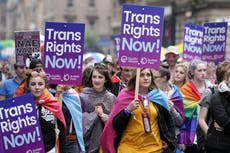Talk of free speech crisis at universities ‘at odds with evidence’, union say
Jo Grady from University and College Union says government is ‘continuing to whip up a phony culture war’

Your support helps us to tell the story
From reproductive rights to climate change to Big Tech, The Independent is on the ground when the story is developing. Whether it's investigating the financials of Elon Musk's pro-Trump PAC or producing our latest documentary, 'The A Word', which shines a light on the American women fighting for reproductive rights, we know how important it is to parse out the facts from the messaging.
At such a critical moment in US history, we need reporters on the ground. Your donation allows us to keep sending journalists to speak to both sides of the story.
The Independent is trusted by Americans across the entire political spectrum. And unlike many other quality news outlets, we choose not to lock Americans out of our reporting and analysis with paywalls. We believe quality journalism should be available to everyone, paid for by those who can afford it.
Your support makes all the difference.Talk of a “free speech crisis” at UK universities is “at odds with evidence”, a union has said as research revealed the overwhelming majority of events are allowed to go ahead.
Fewer than 1 per cent of speaker requests or events were rejected last academic year, according to new figures from the Office for Students (OfS) regulator.
The regulator said 19,407 events with external speakers took place across English universities and colleges across 2020-2021.
Meanwhile just 193 were barred from taking place.
It comes as the government looks to introduce new legislation to protect free speech at universities, including giving the regulator to sanction institutions for breaches.
The bill was put forward by then-education secretary Gavin Williamson, who said he wanted to tackle the “the chilling effect of censorship on campus once and for all”.
“The Tory narrative of a free speech crisis caused by oversensitive students is totally at odds with the evidence,” Jo Grady from the University and College Union (UCU) said after the new figures on rejected events were published.
The union’s general secretary said she would rather ministers focused on tackling “precarious employment practices” that was threatening academic freedom rather than “contining to whip up a phony culture war”.
Susan Lapworth, interim chief executive at the OfS, said: “This data shows that more than 99 per cent of events and speaker requests were approved in 2020-21 and suggests that – in general – universities and colleges remain places where debate and the sharing of ideas can thrive.”
But she added: “However, it is the case that the number and proportion of rejections sharply increased in 2020-21, with almost 200 speakers or events rejected. We would be concerned if those cases suggest that lawful views are being stifled.”
The number of speaker requests or events barred in the last academic year was more than double the year before, when 94 were turned down.
A total of 141 were rejected in 2018-2019 and 53 in 2017-2018.
“The OfS will continue to regulate universities to ensure they are meeting their obligations for freedom of speech. We are willing to intervene where we have concerns this may not be the case in this fundamentally important area,” Ms Lapworth said.
Andrea Jenkyns, the newly-appointed minister for higher education, said: “Universities and colleges must be places that champion debate and diversity of thought and this government has warned of the chilling effect of censorship on our campuses.
“While we know that the pandemic made it difficult for many organisations to arrange speaking events, this sharp rise in rejected speakers is very concerning.”
Ms Jenkyns said the government’s proposed legislation aimed to protect and promote free speech across universities.
The UCU has previously accused the government of “overexaggerating” the threat to free speech in order to push through these new laws.



Join our commenting forum
Join thought-provoking conversations, follow other Independent readers and see their replies
Comments